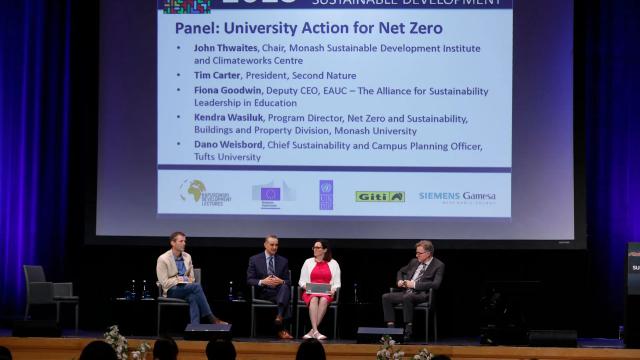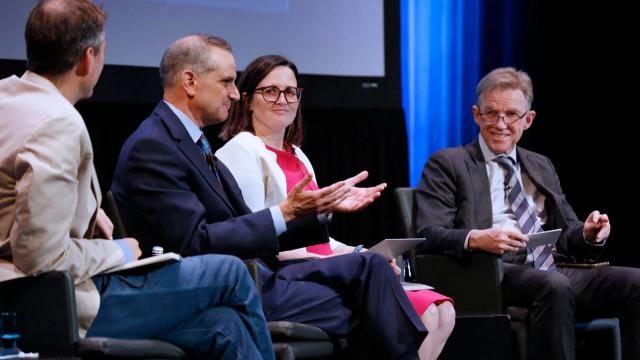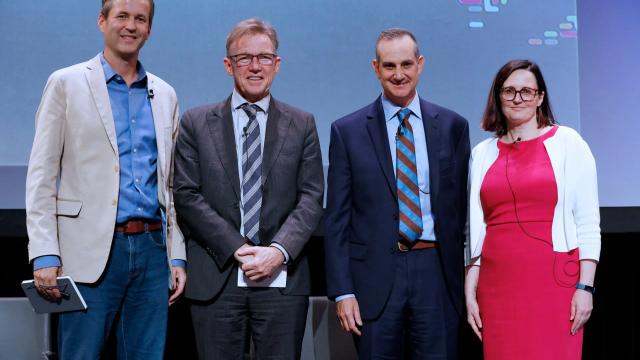Universities Step Up to Offer Practical Solutions to Achieving Net Zero on their Campuses and Beyond
The University Action to Achieve Net Zero panel at ICSD 2023 was moderated by John Thwaites, and included Tim Carter, Dano Weisbord, and Kendra Wasiluk. They discussed steps on the path to university decarbonization, as well as key barriers and enablers.
On September 20th, during the 2023 International Conference on Sustainable Development (ICSD), a panel on “University Action to Achieve Net Zero” was held at Alfred Lerner Hall at Columbia University and live streamed online.
Moderated by John Thwaites, Chair of the Monash Sustainable Development Institute and Climateworks Center, the panel brought together Tim Carter, President of Second Nature, Dano Weisbord, Chief Sustainability and Campus Planning Officer of Tufts University and formerly of Smith College, and Kendra Wasiluk, Program Director of Net Zero and Sustainability, Buildings and Property Division at Monash University.
The panel discussion was preceded by a “Lightning Talk” presentation from Fiona Goodwin, Deputy CEO of The Alliance for Sustainability Leadership in Education (EAUC), who talked about EAUC’s Race to Zero program for universities and colleges. Ms. Goodwin talked about the vast network of higher education institutions on the path to zero carbon emissions, and the steps that EAUC used to support them.
Mr. Thwaites began the discussion by mentioning the Net Zero on Campus Guide and Toolkit, produced by the UN Sustainable Development Solutions Network (SDSN), Monash University’s Energy Institute, and the Climateworks Centre and released in April 2023. Each member of the panel and their affiliate organization played a role in the creation of the guide.
“It’s important that universities have assistance as they embark on this task,” Mr. Thwaites said about the guide. “What we don’t want to see is a situation where universities are making commitments and not able to deliver. That’s why last year we decided that we should put together a guide for universities to use.”
The guide and toolkit offer principles and practices to help universities achieve their sustainability goals. Dr. Wasiluk mentioned how the Net Zero on Campus guide was useful for Monash, following its 4 Pillars of Decarbonization: energy efficiency, renewable energy, electrification, and reduction of non-CO2 emissions. “Having that roadmap set out is what you need to do,” she said.
The panelists discussed some of the specific steps along the decarbonization pathway for higher education institutions, as well as some of the key barriers and enablers.Dr. Carter emphasized the role of presidents and chancellors of colleges and universities. Second Nature calls these leaders to make three commitments. “First is to achieve operational carbon neutrality, second is to expose all students to some form of climate action, and third is to increase the amount of climate research,” he said. He also said that over 15 years, the program has seen success. “It really does matter that senior leaders are bought into these activities.”
Dr. Wasiluk talked about the risks of being innovative at the forefront of sustainability, or the “leading edge/bleeding edge” tension. She said, “At Monash, because we’ve been first on a lot of things, we kind of say we’re at the bleeding edge, trying new, unproven start-up technology.” She called it a challenge, but stressed the value of thinking practically. “It’s the transition from concept to ongoing operation,” she said.
Mr. Weisbord stressed the importance of mission for achieving sustainability in higher education. “Decarbonizing campus is mission-adjacent, but it is not the mission,” he said. Essentially, a university board would rather spend money and time directly on education through libraries and classrooms than through energy infrastructure.To get over that hurdle, his process was to integrate sustainability planning with faculty research and student learning, so that decarbonization is a consideration at all institutional levels. “I think it’s really important to position these projects as deeply part of the mission,” he said.
Other topics touched on by the experts include the role of students in university sustainability, the importance of local partnerships and community collaboration, and the question of whether or not universities should use carbon offsets to reach net-zero.
To learn more, share your own experiences, and be in touch, connect with the Net Zero Community of Practice on LinkedIn.


